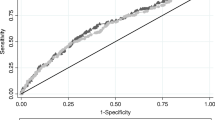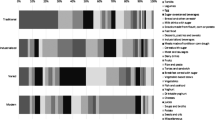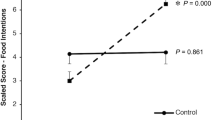Abstract
The objective of this study was to examine relations between state-level school policies and childhood obesity for youth ages 10–17 years. Secondary analysis of the 2003–2006 School Nutrition Environment State Policy Classification System, 2003–2007 Physical Education Related State Policy Classification System, and 2003 and 2007 National Surveys of Children’s Health was performed. Eleven nutrition and 5 physical education (PE) domains were examined for elementary (ES), middle (MS), and high school (HS) children. Logistic regression models examined the association of policies on obesity prevalence in 2007 as well as change scores for the policy assessments. Scores for 5 of 11 nutrition domains and 4 of 5 PE domains increased between 2003 and 2006–2007. Controlling for individual, family and neighborhood factors, nutrition policies were positively associated with the odds of 2007 obesity in 3 ES and 2 MS domains and negatively associated with 1 HS domain. Adjusted positive associations also were observed between 2 ES and 1 MS PE policy domains and 2007 obesity. Controlling for covariates, nutrition policy change scores showed positive associations between increases in 1 ES and 1MS domain, and negative associations with 1 ES and 1 HS domain and 2007 obesity. PE policy change scores showed positive adjusted associations between increases in 2 ES, 2 MS and 1 HS domains and 2007 obesity. The findings indicate that state-level school health policies are associated with childhood obesity after adjusting for related factors, suggesting that states with higher obesity levels have responded with greater institution of policies.
Similar content being viewed by others
Explore related subjects
Discover the latest articles and news from researchers in related subjects, suggested using machine learning.References
Ogden, C. L., Carroll, M. D., Curtin, L. R., McDowell, M. A., Tabak, C. J., & Flegal, K. M. (2006). Prevalence of overweight and obesity in the United States, 1999–2004. JAMA, 295, 1549–1555.
Institute of Medicine, Committee on Prevention of Obesity in Children and Youth, Food and Nutrition Board, Board on Health Promotion and Disease Prevention. (2005). Preventing childhood obesity: Health in the balance. In: J. P. Koplan, C. T. Liverman, V. I. Kraak (Eds.), Washington, DC: The National Academies Press.
Robert Wood Johnson Foundation. (2005). A nation at risk: Obesity in the United States: A statistical sourcebook. Dallas, TX: American Heart Association.
Wang, G., & Dietz, W. H. (2002). Economic burden of obesity in youths aged 5 to 17 years: 1979–1999. Pediatrics, 109, E81–E86.
Finkelstein, E. A., Trogdon, J. G., Cohen, J. W., & Dietz, W. (2009). Annual medical spending attributable to obesity: Payer- and service-specific estimates. Health Affairs, 28(5), 822–831.
Thomas, H. (2006). Obesity prevention programs for children and youth: Why are their results so modest? Health Education Research, 21, 783–795.
Snethen, J. A., Broome, M. E., & Cashin, S. E. (2006). Effective weight loss for overweight children: A meta-analysis of intervention studies. Journal of Pediatric Nursing, 21, 45–56.
Summerbell, C. D., Ashton, V., Campbell, K. J., Edmunds, L., Kelly, S., & Waters, E. (2003). Interventions for treating obesity in children. Cochrane Database Systematic Review, 3, CD001872.
Summerbell, C. D., Waters, E., Edmunds, L. D., Kelly, S., Brown, T., & Campbell, K. J. (2005). Interventions for preventing obesity in children. Cochrane Database Systematic Review, 3, CD001871.
Bell, J., Rogers, V. W., Dietz, W. H., Ogden, C. L., Schuler, C., & Popovic, T. (2011). CDC grand rounds: Childhood obesity in the United States. Centers for Disease Control and Prevention Morbidity and Mortality Weekly Report, 60(2), 42–46.
Swinburn, B., Gill, T., & Kumanyika, S. (2005). Obesity prevention: A proposed framework for translating evidence into action. Obesity Reviews, 6, 23–33.
Nanney, M. S., Toben, N., Wall, M., Haddad, T., Kubik, M., Laska, M. N., et al. (2010). State school nutrition and physical activity policy environments and youth obesity. American Journal of Preventive Medicine, 38(1), 9–16.
Institute of Medicine. (2007). Nutrition standards for foods in schools: Leading the way toward healthier youth. Washington, DC: The National Academies Press.
Masse, L. C., Frosh, M. M., Chriqui, J. F., Yaroch, A. L., Agurs-Collins, T., Blanck, H. M., et al. (2007). Development of a school nutrition-environment state policy classification system (SNESPCS). American Journal of Preventive Medicine, 33(4S), S277–S291.
Masse, L. C., Chriqui, J. F., Igoe, J. F., Atienza, A. A., Kruger, J., Kohl, H. W., et al. (2007). Development of a physical education-related state policy classification system (PERSPCS). American Journal of Preventive Medicine, 33(4S), S264–S276.
Kuczmarski, R. J., Ogden, C. L., Guo, S. S., Grummer-Strawn, L. M., Flegal, K. M., Mei, Z., et al. (2002). 2000 CDC growth charts for the United States: methods and development. Vital Health Statistics, 11(246), 1–190.
StataCorp. (2009). Stata statistical software: Release 11. College Station, TX: StataCorp LP.
Singh, G. K., Kogan, M. D., & van Dyck, P. C. (2010). Changes in state-specific prevalence in the United States from 2003 to 2007. Archives of Pediatrics and Adolescent Medicine, 164(7), 598–607.
Acknowledgments
This study is funded by grant R40 MC 11278-01, through the U.S. Department of Health and Human Services, Health Resources and Services Administration, Maternal and Child Health Bureau.
Author information
Authors and Affiliations
Corresponding author
Rights and permissions
About this article
Cite this article
Riis, J., Grason, H., Strobino, D. et al. State School Policies and Youth Obesity. Matern Child Health J 16 (Suppl 1), 111–118 (2012). https://doi.org/10.1007/s10995-012-1000-4
Published:
Issue Date:
DOI: https://doi.org/10.1007/s10995-012-1000-4




